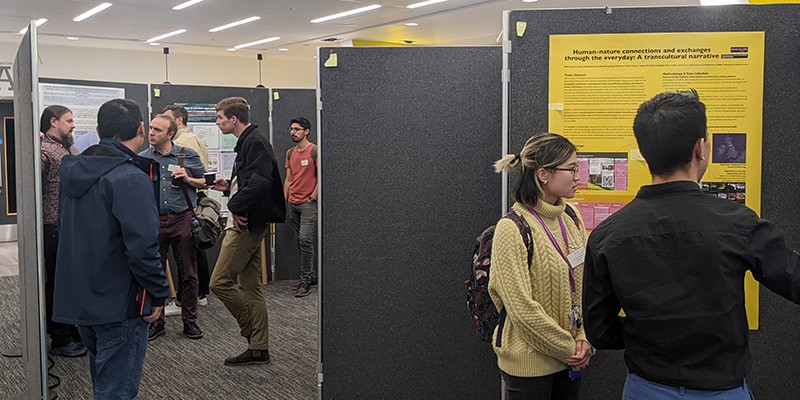Early Career Researchers Symposium builds bridges across Faculties
In June 2022, Early Career Academics and researchers gathered in Manchester for the first cross-Faculty ECR conference on the environment's impact on health. The event was led by the Manchester Environmental Research Institute.
The programme was full of exciting panel sessions, including: healthier urban living, climate change and health and the exposome along with poster sessions and a keynote lecture from Sir Stephen Holgate.
Scientific meetings like this are an important part of research. After two very long years without conferences, in person meetings, and much reduced travel due to the COVID pandemic we wanted this conference to be an opportunity for ECRs and academics who are working on similar issues to come together and learn what each other are doing.
The day kicked off with the Healthier Urban Living panel where panellists looked at the role of the urban environment on overall wellbeing and explore the policies for reducing inequalities in urban settings. After a poster session we moved onto The Exposome panel session where panellists looked at the role of exposures such as noise, chemicals, toxins, water quality in the singular sense and discussed how these can work in combination to effect health and wellbeing. We then broke for lunch where attendees could look at the many ECR posters on display before coming into the auditorium for the Climate Change and Health panel session where panellists explored the challenges and impacts our warming planet has on health and wellbeing and discusses practical solutions. After lunch there was a talk from the universities Researcher Development Team where they outlined the support available to ECRs. The day was rounded off by a talk from Sir Stephen Holgate who is a leading expert on respiratory medicine and air pollution. He talked us through the ground-breaking and landmark case of Ella Adoo-Kissi-Debrah where he was an expert witness. She was the first person in the UK, and possibly in the world, to have air pollution listed as the cause of death on their death certificate and he discussed the journey her family and air quality campaigners went on to achieve this listing.
Watch Stephen’s inspirational talk:
The ECR conference was a great example of how sharing ongoing research between the three faculties, can help to further diversify and gain insight into expertise and methods that might be readily available in one faculty but not another.
The range of topics and posters encouraged participants to leave their comfort zone of familiar questions and topics, and face the huge variety of research that is happening across campus on the environments effect on health. There were a number of poster prizes awarded on the day
- 1st prize - Tadpong Tantipanjaporn for Review of heat-related illness symptoms and heat stress among crop farmers: defining research needs
- 2nd prize - Iris Mair for Ecoimmunology as a holistic approach to investigate environmental drivers of immune variation
- 3rd prize - Jessica Irving for The impacts of age, sex, group size and altitude on nematode faecal egg counts in unmanaged, semi-feral Carneddau ponies (Equus Ferus caballus)
- People’s choice - Charlotte Marris for Exposure to the air pollutant phenanthrene. disrupts calcium cycling, gene expression and electrical activity of human induced pluripotent stem cell derived - cardiomyocytes
The exchange of research at a conference like this is also an important part of the lifecycle of a scientist. Conferences greatly help to form professional networks and spark future research projects and this conference was specifically aimed at early career scientists to expose them to the different research happening across the university. Meeting with so many researchers at a similar career stage was another benefit of the conference, it allowed attendees to have informal chats about the same things people are going through.
At larger conferences ECRs can easily be overshadowed by more senior scientists but we wanted this event to feature ECRs in every aspect which is why every panel session featured an ECR and there was a dedicated ECR poster session. This conference gave more than 15 young scientists the opportunity to present and showcase their work in person.
We are hoping to run another ECR Conference on a different theme in early 2023 so watch this space!


